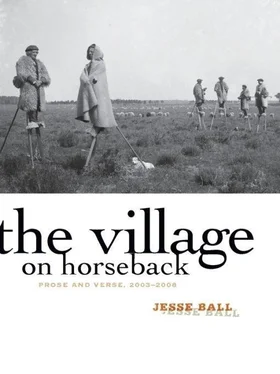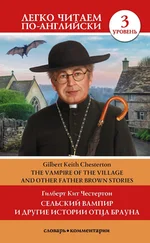Jesse Ball - The Village on Horseback - Prose and Verse, 2003-2008
Здесь есть возможность читать онлайн «Jesse Ball - The Village on Horseback - Prose and Verse, 2003-2008» весь текст электронной книги совершенно бесплатно (целиком полную версию без сокращений). В некоторых случаях можно слушать аудио, скачать через торрент в формате fb2 и присутствует краткое содержание. Год выпуска: 2011, Издательство: Milkweed Editions, Жанр: Современная проза, Поэзия, на английском языке. Описание произведения, (предисловие) а так же отзывы посетителей доступны на портале библиотеки ЛибКат.
- Название:The Village on Horseback: Prose and Verse, 2003-2008
- Автор:
- Издательство:Milkweed Editions
- Жанр:
- Год:2011
- ISBN:нет данных
- Рейтинг книги:5 / 5. Голосов: 1
-
Избранное:Добавить в избранное
- Отзывы:
-
Ваша оценка:
- 100
- 1
- 2
- 3
- 4
- 5
The Village on Horseback: Prose and Verse, 2003-2008: краткое содержание, описание и аннотация
Предлагаем к чтению аннотацию, описание, краткое содержание или предисловие (зависит от того, что написал сам автор книги «The Village on Horseback: Prose and Verse, 2003-2008»). Если вы не нашли необходимую информацию о книге — напишите в комментариях, мы постараемся отыскать её.
Samedi the Deafness
The Way Through Doors,
New Yorker’s
The Village on Horseback
The Village on Horseback: Prose and Verse, 2003-2008 — читать онлайн бесплатно полную книгу (весь текст) целиком
Ниже представлен текст книги, разбитый по страницам. Система сохранения места последней прочитанной страницы, позволяет с удобством читать онлайн бесплатно книгу «The Village on Horseback: Prose and Verse, 2003-2008», без необходимости каждый раз заново искать на чём Вы остановились. Поставьте закладку, и сможете в любой момент перейти на страницу, на которой закончили чтение.
Интервал:
Закладка:
A red blot growing, and then it was a fox, and a wood grew about it, and hills, and a road. A party of horsemen could be seen, and a pole they were carrying, a man hung from it. In the distance, a town of wood, a box of wood, a town like a box of wood. Three suns in the sky, each weaker than the one before. And at the edge of the town, a man with a woman’s skin in his hand. Then the loom cracked in half and broke to the floor, and Elsbeth woke.
Yes, morning bright all about her, and Elsbeth woke, lying in ash, covered in ash, holding the tapestry in her hand that was the record of all that had passed, and on the near slope her horse stood, nosing at the grass, and looking up now and then to see if she was yet awake.
THE END
the early deaths of lubeck, brennan, harp & carr — 2006
the first
Four of them were on one side of a dim room.
— I’m going to try it, said the first.
The girl watched herself in the mirror as the young man approached.
— I wonder, he said. I thought perhaps. .
He stopped mid-sentence, for tears had begun to well up out of the girl’s eyes. She began to cry.
— Please, she said, just leave me alone.
She wore a straight brown dress, buttoned all up the side, and a long tweed coat. Her hair was braided into itself.
— Are you all right? he asked. Can I help you?
— You know, you can’t just speak to people. That’s not how things are anymore. No one wants to just be spoken to.
She rubbed her eyes.
— It’s rather silly of you. Already you look a bit like a fool.
The barkeeper, standing just across the bar, nodded.
— There are rules, he said.
And indeed, on the wall, a list of rules.
— I’m sorry. I didn’t know.
— That’s no excuse.
The girl stood up as if to go.
— I’ll take care of this, Myrna, said the barkeeper. You stay where you are.
He came around the bar towards Harp. He was a big man, with thick forearms like a steelworker.
— It’s time for you to go, lad. The others too.
— Come on, said Harp, taking a step back. The place is empty. I’ll just go back to the table. We’ll mind our own business.
— Hey, Barton! the man called to the back.
Another man appeared.
— Get out.
Harp’s friends had come over.
— What’s the problem? said Lubeck.
— The lot of you, said the barkeeper. Get out.
— We didn’t do anything, said Carr. Why should we leave? Our money’s good.
The girl spoke up.
— He told me if I didn’t go into the back with him he’d hit me. He said he was going to take me off somewhere and tear me in half. Wouldn’t think nothing of it, he said. Just like that.
Her face was fierce and covered in tears.
— What? I didn’t. .
The barkeeper and the man called Barton looked at each other.
Barton grabbed Harp and lifted him from the ground. At a sort of half run, he went for the door and heaved him through.
The barkeeper took Brennan’s shoulder. Brennan wrenched away, and ran for the door past Barton. It was a general flight.
— If I ever see you in here again, said the barkeeper.
Harp’s face was bruised and cut from the street where he’d been thrown. They dusted him off and continued.
— What was that?
— Why did she say that?
— Who was that girl?
They soon came to another place and began again. Lubeck was talking to two dressed like match-stick girls.
— Can you believe it?
— That’s ridiculous, said the first girl. She must have a score to settle, and she can’t settle it.
— I don’t know, said the second girl. Maybe you deserved it. I don’t know.
Lubeck spoke up.
— But Harp didn’t say anything like that. The girl just invented it. She made it all up.
— Well it had to come from somewhere, didn’t it, said the second match-stick girl. It had to come from somewhere.
— That’s right, said the first match-girl. Even if she was making it up.
— But it’s not fair, said Carr. She made the whole thing up. It wasn’t true.
— Well, I guess you’re right then, said the second match-stick girl. But any way you look at it, you lost. If she wasn’t lying, well then, your friend deserved what he got, and it was her speaking up that caused him to get punished, in which case she won, and if she was lying, then she managed to trick those guys into throwing you out, in which case she still won. She won and you lost, and it was the four of you against just her.
That’s pretty good.
The match-stick girls agreed: the girl in the brown dress had won.
An hour or two went by.
It was thus late in the evening when one of the match- stick girls yelped.
— Hey, isn’t that the girl. Isn’t that her out the window?
— That’s her, said Harp. Damned if it isn’t her. Let’s go.
— What’ll we do? asked Carr.
— I don’t know, said Harp. Let’s go.
The party poured out into the street, with the four young men out ahead of the others. Indeed, the long tweed coat and brown dress of the girl could be made out just up ahead. It had snowed the day before, and drifts and piles lined the street. The girl walked there in the company of an older man.
— Let’s pelt them, said Harp.
He forced the brown, gritty snow into a ball as the others did the same. Then with a shout, they ran forward, throwing the snowballs as hard as they could.
The first missed the man’s shoulder by an arm’s length. But the second struck him. He turned, face lit up with anger. The girl stopped too, and turned, and just at the moment, a snowball struck her hard in the face. In the moment before it struck a fact became plain to all of them:
It was not the girl, but someone else, a woman of perhaps forty.
She tumbled down falling heavily onto her back with a cry. The man started after them. What was there to do? They ran. Down the first alley, onto the next street, a right turn, a left, onto another street, onto another alley. They were young and in good health, and so they made it safely away.
the second
Carr woke to banging on the door to his flat. He pulled on a pair of pants and went to see what it was.
It was Harp.
— You’ve got to come with me. It’s bad. Come to Lubeck’s place.
Lubeck and Brennan, two of the four young men, lived near the river in a big house run by Lubeck’s mother.
— Give me a second, said Carr.
He finished dressing and then the two were walking in the street.
— What is it?
— Lubeck got a letter. You’ll see.
More than that, Harp wouldn’t say.
It was Lubeck’s mother let Carr in. Brennan came to the door too. Lubeck was sitting in a chair by the window.
— What is it? asked Carr. What happened?
Brennan took a letter off a side table and handed it to Carr.
— Read it for yourself, he said.
DEAR J. LUBECK,
It is my understanding that you and three others, L. Carr, F. Brennan, and J. Harp, were on Sycamore Street last night where I went walking with my wife. You must understand that we were at the hospital much of the night. My wife has been caused to have a miscarriage. While I might take this matter up with the police, I prefer, as a gentleman, to meet with you and decide the matter by force. Your family has long lived in this town, and so I believe you will honor your commitment. Come then, tomorrow morning, that is, 5 Dec., to the racing track out past Elridge green no later than 6 a.m. Bring a second, as I shall.
most sincerely,
Judge Allen Henry
— Believe it, said Lubeck’s mother.
Читать дальшеИнтервал:
Закладка:
Похожие книги на «The Village on Horseback: Prose and Verse, 2003-2008»
Представляем Вашему вниманию похожие книги на «The Village on Horseback: Prose and Verse, 2003-2008» списком для выбора. Мы отобрали схожую по названию и смыслу литературу в надежде предоставить читателям больше вариантов отыскать новые, интересные, ещё непрочитанные произведения.
Обсуждение, отзывы о книге «The Village on Horseback: Prose and Verse, 2003-2008» и просто собственные мнения читателей. Оставьте ваши комментарии, напишите, что Вы думаете о произведении, его смысле или главных героях. Укажите что конкретно понравилось, а что нет, и почему Вы так считаете.












